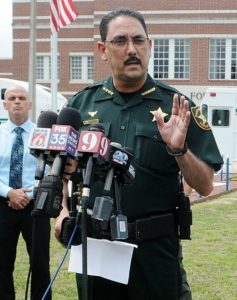Political grandstanding and law enforcement don’t mix. But it happens when top cops are elected, as most sheriffs are, and isn’t new.
Latest example: Sheriff Billy Woods of Marion County, in north-central Florida, has decreed that masks won’t be worn in his office. Not by sheriff’s department employees, the public, or visitors. Anyone who does will be asked to leave.
He was reacting to the Ocala City Council overriding a mayor’s veto of an emergency ordinance mandating mask-wearing inside city businesses.
 His justification? “The fact is, the amount of professionals that give the reason why we should, I can find the exact same amount of professionals that say why we shouldn’t,” Woods writes, which isn’t true; health professionals are nearly unanimous that masks are crucial for stopping Covid-19.
His justification? “The fact is, the amount of professionals that give the reason why we should, I can find the exact same amount of professionals that say why we shouldn’t,” Woods writes, which isn’t true; health professionals are nearly unanimous that masks are crucial for stopping Covid-19.
He continued, “our number of cases so far has proven that the current way we are approaching the issue is working,” which isn’t true, either; Covid-19 cases are exploding in his jurisdiction. But it plays well to his conservative supporters.
Read story here.
Woods isn’t by any means the first elected sheriff to use his office to promote extreme political views.
For 15 years, Milwaukee County, Wisconsin, had a sheriff named David Clarke, initially appointed to a vacancy by a GOP governor then elected several times by running as a Democrat in the heavily Democratic county, who’s a vocal Trump supporter. Clarke resigned after a series of controversies including inmate deaths in the jail he was responsible for supervising.
In Nevada, former sheriff Richard Mack is a prominent rightwing political activist and was a Cliven Bundy supporter during the 2014 standoff between armed vigilantes and Bureau of Land Management law enforcement officers. In Oregon, during the 2016 armed occupation of the federal Malheur Wildlife Refuge by anti-government extremists led by Bundy’s son, a local sheriff named Glenn Palmer visited the occupiers and called them “patriots.”
In 2020, in Douglas County, Nevada, a sheriff named Daniel Coverley announced his office would stop responding to 911 calls from the public library after the library board adopted a statement of support for the Black Lives Matter movement, which Coverley calls “anti-police.”
In the sovereign citizen movement, county sheriffs are considered the highest-ranking government authority, indeed the only authority they’re willing to recognize. This makes sense, from their perspective, because in rural counties where the movement is prevalent and anti-government sentiments often are strong, elected sheriffs tend to be very conservative.
In urban counties, or counties with cities, it’s not unusual to have parallel law enforcement systems, i.e. a county sheriff and a city police department. Police chiefs are almost always appointed by a mayor or governing body. Sheriffs are elected in many places, but not always; for example, King County, Washington (where Seattle is located) will ask voters this fall to change from an elected to appointed sheriff.
Sheriffs also have statutory duties, such as serving process and carrying out evictions or property seizures, and have full authority within municipal police jurisdictions in their counties, so they operate where there are local police, too.
But in many places outside major cities, the elected sheriff and his deputies are the only law enforcement there is. Many of these sheriffs are competent professionals doing a good job, but law enforcement can be spotty where you have political sheriffs with marginal qualifications. But the system of electing sheriffs is deeply entrenched, and isn’t going away.
Some political sheriffs subordinate the laws they’re supposed to enforce to political aims. There have been disturbing cases of sheriffs trying to dictate what is “constitutional” (only courts can make that decision) to the derogation of the rights of citizens, the authority of governors, legislatures, and courts, and the principle that all laws must be obeyed, not just ones you agree with. These things have consequences. Take Sheriff Woods, for example. His edict may be trivial in its reach, but he’s fomenting rebellion against mask rules at a time when people are assaulting those trying to enforce them.
Photo: Florida Sheriff Billy Woods announcing his mask ban